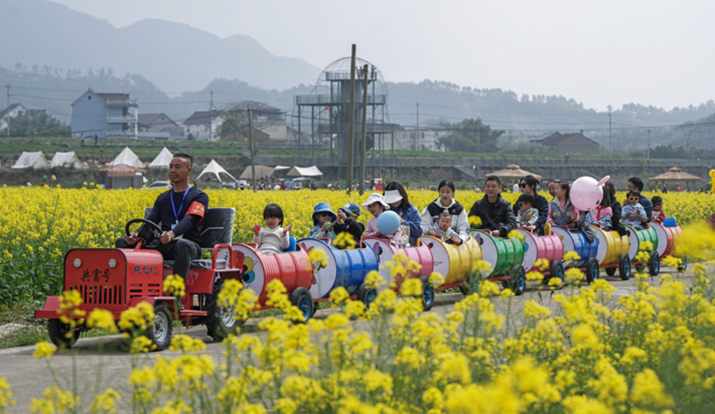|
||||||||||
| Home Nation World Business Opinion Lifestyle ChinAfrica Multimedia Columnists Documents Special Reports |
|
||||||||||
| Home Nation World Business Opinion Lifestyle ChinAfrica Multimedia Columnists Documents Special Reports |
| ChinAfrica |
| Ensuring Equal Rights for All |
| There is no one-size-fits-all model of human rights protection - countries must find their owns solutions |
| By Mahasha Rampedi 丨ChinAfrica Web Exclusive ·2023-06-15 |

Tourists tour rape flower fields on a small train in a village in Hangzhou, Zhejiang Province in east China, on 12 June (XINHUA)
At the height of human rights abuses globally, the World Conference on Human Rights held in Vienna, Austria, adopted the Vienna Declaration and Programme of Action (VDPA) in 1993. This is a significant human rights document aimed to address the state of human rights globally and set a framework for promoting and protecting human rights in the future. Adopted unanimously, the VDPA recognises that the promotion and protection of human rights is a legitimate concern of the international community and that governments bear the primary responsibility for safeguarding these rights.
Importantly, the programme recognises the importance of non-discrimination in human rights. It specifically stresses that human rights should be respected without distinction of any kind, such as race, colour, sex, national or social origin, birth, or other status. This reaffirmation of non-discrimination has been instrumental in advocating for equal rights and combating discrimination globally.
This year marks the 30th anniversary of the adoption of the VDPA. It is thus fitting to take a closer look at the impact of the programme on human rights globally, and the roles and contributions of countries such as China, Russia, the US and the West in general. Equally, it is important to scrutinise the modalities and tools used to promote and defend human rights, and their effectiveness.
Complex problem
Assessing the human rights record of any country or group of countries is a complex task that requires a comprehensive analysis of various factors. It's important to note that human rights records can vary across countries, as each nation has its own specific context and challenges. Some countries may have stronger records, while others may face more criticism in certain areas.
War is a major factor that damages human rights. Over the years, various wars and conflicts have taken place around the world, involving both Western and non-Western countries. The causes of these wars are often multifaceted, including factors such as territorial disputes, ideological differences, ethnic tensions, and resource competition.
While it is difficult to provide an exact number of wars started by the US and the West, it is true that Western countries, particularly the US, have been involved in military interventions in different regions. Some notable examples include the Vietnam War, the Iraq War, and military actions in Afghanistan, Libya, and Syria. However, it is important to recognise that these interventions were not solely initiated by the US or the West, and they often involved coalitions or alliances with other countries.
In addition, the US also faces criticism and challenges in fulfilling their human rights obligations. Concerns have been raised regarding issues such as racial discrimination, the treatment of migrants and refugees, surveillance practices, and the use of force in law enforcement.
This begs the question: Is there a one-size-fits-all model of human rights protection in the world? The answer is definitely no. Other factors like economic development, poverty alleviation and infrastructure projects can and do play a major role in the promotion and defence of human rights. Put differently, the right to life and the right to development are the most important human rights and should be enjoyed by all human beings. Countries like China and Rwanda have proven that beyond a reasonable doubt.
China’s record
China has made remarkable progress in terms of economic development and infrastructure projects. Through its economic reforms and policies, China has achieved rapid economic growth, lifting hundreds of millions of people out of poverty. It has become the world's second-largest economy and has invested heavily in infrastructure development, including transportation networks, high-speed railways, and urbanisation projects.
China's Belt and Road Initiative (BRI) is a significant infrastructure project aimed at enhancing connectivity and economic cooperation with countries along its proposed routes. The BRI has seen massive investments in infrastructure projects globally, fostering trade and economic development. After more than a decade’s hard work, China has successfully eliminated absolute poverty throughout the country. The Chinese government has implemented poverty alleviation programmes, including targeted measures to improve access to education, health care, and social welfare. These efforts have resulted in a significant reduction in the number of people living in extreme poverty in China.
In 2020, China declared that it had achieved the goal of eradicating extreme poverty throughout the country. As we speak, none of the Chinese nationals has to worry about food, housing, basic medical care, schooling and clothing. This is the greatest achievement made in human rights protection. Through cooperation and partnership, China and African countries are also protecting human rights in the continent through building infrastructure, investment, improving employment and so on under frameworks such as the Forum on China-Africa Cooperation and the BRI.
This is proof that there is no one-size-fits-all model of human rights protection. Every country, especially developing countries like China and Africa countries, should have its own formula for protecting human rights. Measures should be formulated according to their specific national conditions. They should not be pressured by third parties to adopt certain human rights models.
The author is editor in chief of AT News (African Times), South Africa
| About Us | Contact Us | Advertise with Us | Subscribe |
| Copyright Beijing Review All rights reserved 京ICP备08005356号-5 京公网安备110102005860号 |